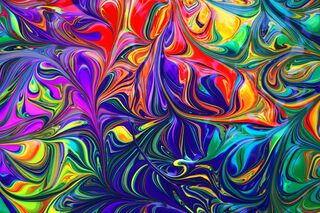Personality
Can Hallucinogens Improve Personality?
Some people became less anxious, critical, and quarrelsome.
Posted December 22, 2021 Reviewed by Abigail Fagan
Key points
- Surveys of people before and after psychedelic experiences found that people became less anxious, less critical, and less quarrelsome afterwards.
- People who showed the largest reductions in anxiety were those who initially scored high on anxiety.
- Psychedelics carry risks for those with a heightened risk of psychosis and for those who may experience hallucinogen-persisting disorder.

A new paper published in Frontiers in Psychology suggests that using psychedelics such as psilocybin, LSD, and ayahuasca can promote positive and long-term personality changes — for instance, becoming less quarrelsome or critical with others and becoming less upsettable and anxious. But there are downsides as well.
“Psychedelics do carry risks including the potential for hallucinogen-persisting disorder, a condition characterized by persistent hallucinogenic effects including perceptions of light and sound,” says Brandon Weiss, a psychologist at Imperial College London and the lead of the research. “Psychedelics are also considered to place individuals at heightened risk for psychosis. For this reason, current studies are careful not to include people with a family history of schizophrenia or bipolar disorder.”
To better understand the risks and benefits of psychedelic experiences, the researchers invited 148 adults in the general population who were planning to have a psychedelic experience to answer questions about their personality and social relationships at three points in time: (1) before their psychedelic experience, (2) two weeks after their experience, and (3) four weeks after their experience.
The researchers measured personality traits from the Big 5 model of personality, including agreeableness, extraversion, and neuroticism. They also measured two types of social connectedness: perceived belongingness in one’s community and the strength of one’s social relationships in general.
They found that two traits showed significant change after people engaged in a psychedelic experience.
“First, people seemed to report that they were not as quarrelsome or critical in their interactions with others,” comments Weiss. “Second, people reported that they were less easily upset by things and less anxious.”
They also found that the people who showed the largest reductions in anxiety after their psychedelic experience were those who initially scored high on anxiety, suggesting that there may be more benefits to using psychedelics for individuals with higher neuroticism, at least when it comes to managing anxiety.
But more data is needed to confirm these claims.
“Although these results are very interesting and make worthwhile contributions to what we know, approximately 80% of the sample we began with dropped out of the study before completing it,” says Weiss. “Therefore, we cannot say that this is a fully representative sample of the general population. In addition, it could be that mostly those who had good experiences stayed in the study whereas others dropped out.”
Nevertheless, this study adds another data point to the growing body of research that suggests psychedelics may be useful in clinical settings.
“I think it will be very interesting to continue exploring the potential for psychedelics and psychedelic-assisted therapy to reduce anger reactivity, quarrelsomeness, and criticalness,” says Weiss. “Studies that would be very helpful toward this end include those that use a disharmony-focused therapy, such as components of Dialectical Behavior Therapy, and recruit people who are low in agreeableness to start.”
Facebook image: Impact Photography/Shutterstock
References
Weiss, Brandon (Interview) Exploring the pros and cons of psychedelic use. Therapytips.org, December 14, 2021.
Weiss B, Nygart V, Pommerencke LM, Carhart-Harris RL and Erritzoe D (2021) Examining Psychedelic-Induced Changes in Social Functioning and Connectedness in a Naturalistic Online Sample Using the Five-Factor Model of Personality. Front. Psychol. 12:749788. doi: 10.3389/fpsyg.2021.749788


